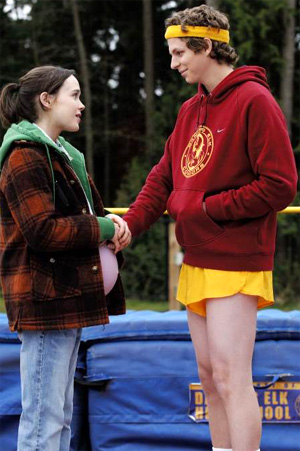
At first glance Kiss Me Deadly may look like a decent movie, but let me warn you - I would classify it as one of the biggest let-downs I have ever experienced. Don't get me wrong I thought the script was well written, the characters were fairly well developed but the ending pushed the film from a depiction of the realistic everyday world to science fiction ridiculousness.
I truly did enjoy the beginning of the film. I thought the opening scene with the pyschotic woman running down the street was a creative attention grabber. As gross and discusting as it was, I also thought the torture scene was somewhat tasteful. It was disturbing but most certainly didn't give me the feeling that I was going to vomit.
I also found it noir-like that the main character wasn't quite likeable. He was horrible to his secretary/girlfriend and basically used her to get information from other people by encouraging her to sleep with them. He also set himself up to fail by making stupid decisions, similar to other film noir detectives.
But the closing scene caused the film to take a turn for the worse. Throughout the entire film the suspense of the "the great whatsit" is built. We follow Mike Hammer, played by Ralph Meeker, on his mission to uncover the secret the hitch hiker was hiding. After a pretty drawn out excursion we discover that inside the "great whatsit" is a light? a burning light of some sort? But the "great whatsit" is not just a burning light! - we then follow Mike Hammer to Gabrielle (who was pretending to be the hitch hiker Christina's roommate but ends up playing the femme fatale) who now has possession of the "great whatsit" she asks Mike to kiss her, and then shoots him - but no, he does not die! She then opens the box which happens to be some type of radionuclide material and screams mixed with flames take over the scene. Mike saves Velda and they run out of the house onto the beach and escape to happiness - psych! The whole world then explodes and everyone dies.
I know this ending may have been intended to indirectly display nuclear fears of the Cold War. But I feel it is a little too unrealistic to actually achieve that goal. The ending seems so ridiculous that it becomes almost humorous. If I could have the opportunity, I would love to speak to A. I. Bezzerides and ask him if he intended for the closing scene of the film to be realistic or actually wanted to portray the outrageousness - either way the viewer is still left asking, what the heck just happened?
I truly did enjoy the beginning of the film. I thought the opening scene with the pyschotic woman running down the street was a creative attention grabber. As gross and discusting as it was, I also thought the torture scene was somewhat tasteful. It was disturbing but most certainly didn't give me the feeling that I was going to vomit.
I also found it noir-like that the main character wasn't quite likeable. He was horrible to his secretary/girlfriend and basically used her to get information from other people by encouraging her to sleep with them. He also set himself up to fail by making stupid decisions, similar to other film noir detectives.
But the closing scene caused the film to take a turn for the worse. Throughout the entire film the suspense of the "the great whatsit" is built. We follow Mike Hammer, played by Ralph Meeker, on his mission to uncover the secret the hitch hiker was hiding. After a pretty drawn out excursion we discover that inside the "great whatsit" is a light? a burning light of some sort? But the "great whatsit" is not just a burning light! - we then follow Mike Hammer to Gabrielle (who was pretending to be the hitch hiker Christina's roommate but ends up playing the femme fatale) who now has possession of the "great whatsit" she asks Mike to kiss her, and then shoots him - but no, he does not die! She then opens the box which happens to be some type of radionuclide material and screams mixed with flames take over the scene. Mike saves Velda and they run out of the house onto the beach and escape to happiness - psych! The whole world then explodes and everyone dies.
I know this ending may have been intended to indirectly display nuclear fears of the Cold War. But I feel it is a little too unrealistic to actually achieve that goal. The ending seems so ridiculous that it becomes almost humorous. If I could have the opportunity, I would love to speak to A. I. Bezzerides and ask him if he intended for the closing scene of the film to be realistic or actually wanted to portray the outrageousness - either way the viewer is still left asking, what the heck just happened?





